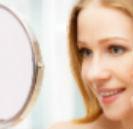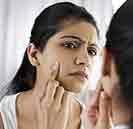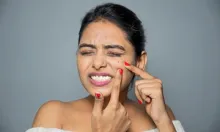Acne - Overview
What is Acne?
Acne is a skin condition that generally occur when the hair follicles on your skin get blocked with excess sebum (oil) or dead skin cells. It is one of the most common skin diseases. Acne is commonly referred to as ‘pimples’ or ‘zits’. Most people believe that acne only affects teenagers. Although it is more common among teenagers, it can affect people of any age. According to the National Institute of Health, about 4 out of every 5 people experience acne breakouts between the age of 11 and 30 years.
Many people experience acne during puberty. It is characterised by pimples on face, pimples on back and pimples on head. It can also be seen on the neck, scalp, chest, shoulders and upper arms. Both men and women can be affected by acne, but it develops differently in both the sexes. Young men tend to get more severe acne outbreaks, whereas women tend to have an intermittent pattern, which is usually related to their menstrual cycles.
Acne or pimples can be seen as tiny, white spots on skin (whiteheads), black spots (blackheads), tiny, painful, red bumps or pus-filled, painful swelling. In a majority of the cases, the condition generally begins around the age of 10 to 13 years. Severe acne can lead to scarring of the skin (acne scars).
Causes of Acne
Every pore on your skin is the opening to a follicle. The follicle consists of a hair and a sebaceous (oil) gland. The sebaceous gland releases sebum (oil) which keeps your skin soft and lubricated. Acne or pimples are caused when skin pores are blocked due to excess sebum secretion. Pimples can also develop if the skin pores are blocked due to dead skin cells or any bacterial build up. Pimples are usually found in areas of the body with most oil glands. Therefore, pimples on face, pimples on forehead and pimples on back are very common. Some individuals also experience scalp acne. Changes in hormone levels also have an impact on sebum secretion. This is the reason acne is more commonly seen during puberty, as hormone levels escalate during this age. Poor personal hygiene can also lead to a build-up of grease, which can trigger pimples.
Types
Acne or pimples can be seen in many forms. There are 4 major types of acne:
- Whiteheads – They are tiny, white spots on skin that appear due to closed or clogged skin pores.
- Blackheads – They are small bumps that appear on your skin due to closed or clogged skin pores. They are dark or black in colour.
- Pustules – They are tender, red bumps with white pus at the tips.
- Papules – They are small, red, raised bumps without any fluid, caused by infected or inflamed hair follicles.
- Cysts – Cystic acne often appears like boils on the skin. It is the largest in size among the acne types and is rooted deeply within the skin.
- Nodules – They appear as small bumps under your skin and can turn red as the surrounding area gets more inflamed. It is caused due to bacterial infection in the skin pores.
What all these types have in common is that they can be treated. They can be almost completely or partially removed from the skin, if treated on time.
Impact of Acne
Though it is a skin condition, pimples are known to cause more damage to the patient's psyche than to the skin. Clear, healthy skin goes a long way in boosting a person’s self-image. Given the fact that pimples can considerably affect the physical appearance of a person, it has a significant impact on self-confidence and self-image. According to a study conducted by the Brazilian Society of Dermatology with adolescents in Greece, acne affects the quality of life. The study found that the impact is proportional to the severity of acne. More severe acne is associated with greater effect on quality of life, with implications on self esteem, body image and relationships with others.
Homeopathic Treatment for Acne
Prompt medical attention is essential for effective treatment for acne or pimples. A natural and safe medium to treat acne is through homeopathy. Homeopathy focuses on individualised treatment. It offers different remedies for different types of acne based on its presentation. The best part about homeopathic treatment for pimples is that it has no side-effects and can be safely taken for a long period of time. Homeopathic medicines also stimulate the individual’s immunity from within. Thus, homeopathy can combat acne or pimples from the root and restore healthy skin, along with a feeling of general well-being and renewed self-esteem.
Why Dr Batra’s™?
At Dr Batra’s™, we have the experience and expertise of having treated more than 10,000 cases of acne over the past 35 years. We have a success rate of 94.3% in treating skin disorders, including acne/pimples, as authenticated by American Quality Assessors.
Find out your skin health score, take the skin evaluation test: Test Now
FAQs
How long does scalp acne last?
What happens if you don't remove blackheads?
Can pimples on scalp cause hair loss?
Why is my face breaking out with acne?
How do I stop pimples on my face?
- Wash your face with a mild cleanser at least twice a day to remove excess oil, dirt and sweat.
- Choose products for your face based on your skin type.
- Use fragrance-free, non-comedogenic moisturizers that won’t irritate or clog your pores.
- Stay well-hydrated as dehydration can signal your body’s oil glands to generate more oil.
- Limit the use of makeup. Excessive use of makeup may clog skin pores and trigger pimple breakouts.
- Wash your hands regularly and try to touch your face as little as possible.
- While stepping out in the sun, use an oil-free, non-comedogenic sunscreen.
- Don't pop your pimples as it can lead to acne scars. It can also clog and cause inflammation in the surrounding pores, worsening the condition.


